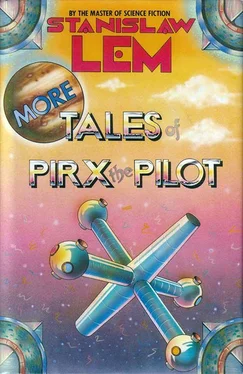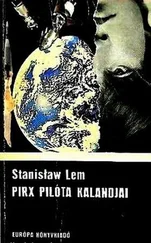Slowly, groping, he raised the butt of his laser and loosened his muscles. “Dr. McCork!” he said. “Could you come here?”
And when the doctor had scrambled up to him, he said:
“You see the two cylinders? One straight ahead, below us, and the other farther on?”
“I see them.”
“Fire at the closer one first, then at the other, in an interval, say, of forty seconds… But not from here!” he added quickly. “You’ll have to find a better place. Ah!” He pointed with his hand. “There is not a bad position, in that hollow. And after you shoot, crawl back immediately. All right?”
McCork asked no questions but set off at once, keeping low, in the direction indicated. Pirx waited impatiently. If he was even a little like a man, he had to be curious. Every intelligent creature was curious—and curiosity prompted it to act when something incomprehensible took place… He couldn’t see the doctor now. He forced himself not to look at the cylinders, which were to explode under McCork’s shots; he focused all his attention on the stretch of sunlit debris between the zone of shadow and the outcrop. He lifted the binoculars to his eyes and trained them on that section of the lava flow. In the lenses grotesque shapes filed slowly by, shapes as though formed in the studio of some sculptor-abstractionist; tapering obelisks twisted about like screws, plates furrowed with snaking cracks—the jumble of glaring planes and zigzag shadows had an irritating effect on the eye.
At the very edge of his vision, far below him, on the slope, there was a burgeoning flash. After a long pause, the second went off. Silence. The only sound was his pulse throbbing inside his helmet, through which the sun was trying to bore its way into his skull. He swept the lenses along a stretch of chaotically interlocking masses.
Something moved. He froze. Above the razorlike edge of a slab that resembled the fractured blade of some giant stone ax there emerged a shape, hemispherical, in color much like a dark rock, but this shape had arms, which took hold of the boulder from both sides. Now he could see it—the upper half of it. It didn’t look headless, but, rather, like a man wearing the supernatural mask of an African shaman, a mask that covered the face, neck, and chest, but flattened out in a manner that was somewhat monstrous. With the elbow of his right arm Pirx felt the butt of his laser, but he didn’t dream of shooting now. The risk was too great—the chance of getting a hit with a relatively weak weapon, and at such a distance, was minuscule. The other, motionless, seemed to be examining with that head it had, which barely protruded above the shoulders, the remains of the two gas clouds that were drifting along the slope, helplessly expanding into space. This lasted a good while. It looked as if it did not know what had happened, and was unsure of what to do. In that hesitation, that uncertainty, which Pirx could understand full well, there was something so uncannily familiar, so human, that he felt a lump in his throat. What would I do in his place, what would I think? That someone was firing at the very same objects I had fired at before, and therefore this someone would be not an opponent, not an enemy, but instead a kind of ally. But I would know, surely, that I had no ally. Ah, but what if it were a being like myself?
The other stirred. Its movements were fluid and uncommonly swift. All at once it was in full view, erect on that upended stone, as though still looking for the mysterious cause of the two explosions. Then it turned away, jumped down, and, leaning slightly forward, began to run—now and then it dropped from Pirx’s sight, but never for more than a few seconds, only to break out into the sunlight again on one of the spurs of the magma labyrinth. In this way it approached Pirx, though running the whole time at the bottom of the basin. They were separated now only by the space of the slope, and Pirx wondered whether he shouldn’t shoot, after all. But the other whisked past in narrow strips of light and again dissolved into the blackness—and since it continually had to change direction, picking its way between the rocks and rubble, one could not predict where its arms, working to maintain balance like those of a man running, and where its headless trunk would show up next, to flash metallically and vanish once again.
Suddenly ragged lightning cut across the mosaic of debris, striking long plumes of sparks among the very blocks where the Setaur was running. Who had fired that? Pirx couldn’t see McCork, but the line of fire had come from the opposite side—it could only have been the cadet, that snot-nosed kid, that idiot! He cursed him, furious, because nothing had been accomplished, of course—the dome of metal flitted on for another fraction of a second, then disappeared for good. “And not only that, but he tried to shoot him in the back!” thought Pirx in a fury, not at all appreciating the absurdity of this reproach.
The Setaur hadn’t returned fire. Why? Pirx tried to catch a glimpse of it—in vain. Could the bulge of the slope be in the way? That was entirely possible… In which case he could move safely now… Pirx slipped down from his boulder, seeing that nothing was any longer watching from below. He ran, hunched over slightly, along the rim itself; he passed the cadet, who lay prone as if on a rifle range—feet flung-out wide and pressed sideways against the rock—and Pirx felt an unaccountable urge to kick him in his behind, which stuck up ludicrously and was male even more conspicuous by a poorly fitting suit. He slowed down, but only to shout:
“Don’t you dare shoot, do you hear me? Put away that laser!”
And before the cadet, turning on his side, began to look around in bewilderment—for the voice had come from his earphones, giving no indication of where Pirx was located—Pirx had already run on; afraid that he was wasting precious time, he hurried as much as he could, till he found himself facing a broad crevasse, which opened up a sudden view all the way to the bottom of the basin.
It was a type of tectonic trench, so old that its edges had crumbled, lost their sharpness, and resembled a mountain gully widened by erosion. He hesitated. He didn’t see the Setaur, but, then, it was probably impossible to see it anyway from this vantage point. So he ventured into the gully with laser at the ready, well aware that what he was doing was insane, yet unable to resist whatever was driving him; he told himself that he only wanted to take a look, that he would stop at the first place where he could check out the last section of the outcrop and the entire labyrinth of rubble beneath it; and perhaps, even as he ran, still leaning forward, with the gravel shooting out in streams from under his boots, he actually believed this. But at the moment he couldn’t give thought to anything. He was on the Moon and therefore weighed barely fifteen kilograms, but even so the increasing angle tripped him up; he went bounding along eight meters at a time, braking for all he was worth; already he had covered half the length of the slope.
The gully ended in a shallow pathway—there in the sun stood the first masses of the lava flow, black on the far side and glittering on the southern, about one hundred meters down. “I got myself into it this time,” he thought. From here one could practically reach out and touch the region in which the Setaur was at large. He glanced rapidly to the left and to the right. He was alone; the ridge lay high above him, a broiling steepness against the black sky. Before, he had been able to look down into the narrow places between the rocks almost with a bird’s-eye view, but now that crisscross maze of fissures was blocked out for him by the nearest masses of stone. “Not good,” he thought. “Better go back.” But for some reason he knew that he wasn’t going back.
Читать дальше












